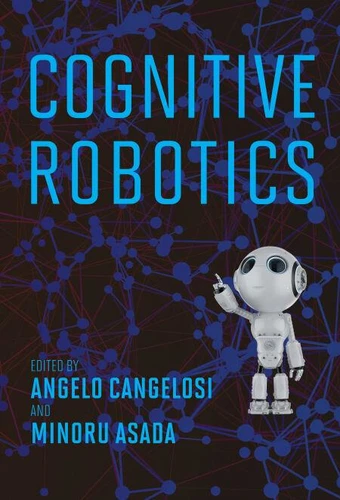Cognitive Robotics
Par : ,Formats :
Disponible dans votre compte client Decitre ou Furet du Nord dès validation de votre commande. Le format ePub protégé est :
- Compatible avec une lecture sur My Vivlio (smartphone, tablette, ordinateur)
- Compatible avec une lecture sur liseuses Vivlio
- Pour les liseuses autres que Vivlio, vous devez utiliser le logiciel Adobe Digital Edition. Non compatible avec la lecture sur les liseuses Kindle, Remarkable et Sony
- Non compatible avec un achat hors France métropolitaine
 , qui est-ce ?
, qui est-ce ?Notre partenaire de plateforme de lecture numérique où vous retrouverez l'ensemble de vos ebooks gratuitement
Pour en savoir plus sur nos ebooks, consultez notre aide en ligne ici
- Nombre de pages496
- FormatePub
- ISBN978-0-262-36933-6
- EAN9780262369336
- Date de parution17/05/2022
- Protection num.Adobe DRM
- Taille78 Mo
- Infos supplémentairesepub
- ÉditeurThe MIT Press
Résumé
The current state of the art in cognitive robotics, covering the challenges of building AI-powered intelligent robots inspired by natural cognitive systems. A novel approach to building AI-powered intelligent robots takes inspiration from the way natural cognitive systems-in humans, animals, and biological systems-develop intelligence by exploiting the full power of interactions between body and brain, the physical and social environment in which they live, and phylogenetic, developmental, and learning dynamics.
This volume reports on the current state of the art in cognitive robotics, offering the first comprehensive coverage of building robots inspired by natural cognitive systems. Contributors first provide a systematic definition of cognitive robotics and a history of developments in the field. They describe in detail five main approaches: developmental, neuro, evolutionary, swarm, and soft robotics. They go on to consider methodologies and concepts, treating topics that include commonly used cognitive robotics platforms and robot simulators, biomimetic skin as an example of a hardware-based approach, machine-learning methods, and cognitive architecture.
Finally, they cover the behavioral and cognitive capabilities of a variety of models, experiments, and applications, looking at issues that range from intrinsic motivation and perception to robot consciousness. Cognitive Robotics is aimed at an interdisciplinary audience, balancing technical details and examples for the computational reader with theoretical and experimental findings for the empirical scientist.
This volume reports on the current state of the art in cognitive robotics, offering the first comprehensive coverage of building robots inspired by natural cognitive systems. Contributors first provide a systematic definition of cognitive robotics and a history of developments in the field. They describe in detail five main approaches: developmental, neuro, evolutionary, swarm, and soft robotics. They go on to consider methodologies and concepts, treating topics that include commonly used cognitive robotics platforms and robot simulators, biomimetic skin as an example of a hardware-based approach, machine-learning methods, and cognitive architecture.
Finally, they cover the behavioral and cognitive capabilities of a variety of models, experiments, and applications, looking at issues that range from intrinsic motivation and perception to robot consciousness. Cognitive Robotics is aimed at an interdisciplinary audience, balancing technical details and examples for the computational reader with theoretical and experimental findings for the empirical scientist.
The current state of the art in cognitive robotics, covering the challenges of building AI-powered intelligent robots inspired by natural cognitive systems. A novel approach to building AI-powered intelligent robots takes inspiration from the way natural cognitive systems-in humans, animals, and biological systems-develop intelligence by exploiting the full power of interactions between body and brain, the physical and social environment in which they live, and phylogenetic, developmental, and learning dynamics.
This volume reports on the current state of the art in cognitive robotics, offering the first comprehensive coverage of building robots inspired by natural cognitive systems. Contributors first provide a systematic definition of cognitive robotics and a history of developments in the field. They describe in detail five main approaches: developmental, neuro, evolutionary, swarm, and soft robotics. They go on to consider methodologies and concepts, treating topics that include commonly used cognitive robotics platforms and robot simulators, biomimetic skin as an example of a hardware-based approach, machine-learning methods, and cognitive architecture.
Finally, they cover the behavioral and cognitive capabilities of a variety of models, experiments, and applications, looking at issues that range from intrinsic motivation and perception to robot consciousness. Cognitive Robotics is aimed at an interdisciplinary audience, balancing technical details and examples for the computational reader with theoretical and experimental findings for the empirical scientist.
This volume reports on the current state of the art in cognitive robotics, offering the first comprehensive coverage of building robots inspired by natural cognitive systems. Contributors first provide a systematic definition of cognitive robotics and a history of developments in the field. They describe in detail five main approaches: developmental, neuro, evolutionary, swarm, and soft robotics. They go on to consider methodologies and concepts, treating topics that include commonly used cognitive robotics platforms and robot simulators, biomimetic skin as an example of a hardware-based approach, machine-learning methods, and cognitive architecture.
Finally, they cover the behavioral and cognitive capabilities of a variety of models, experiments, and applications, looking at issues that range from intrinsic motivation and perception to robot consciousness. Cognitive Robotics is aimed at an interdisciplinary audience, balancing technical details and examples for the computational reader with theoretical and experimental findings for the empirical scientist.



